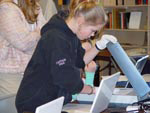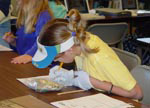A 7th & 8th Grade Project

Richard Moore, a 7th and 8th grade teacher at Philip W. Sugg Middle School in Lisbon Falls, knew the town had a rich history, an active historical society, and a group of Gifted & Talented students who were ready for a new challenge.
The school's local history project began soon after staff from the Maine Historical Society gave Moore's class a demonstration of the Maine Memory Network. The students were quick to master Maine Memory's search and exhibit-building tools, but they were disappointed to find so little material related to the history of THEIR community on Maine Memory.
Working with MHS staff, Moore set up a meeting at the school with members of the Lisbon Historical Society. Those members brought photo albums and other historical materials to the school to give the students a sense of some of the town's history, and of the rich material in their collection. Four topics were of special interest to the students: the town's old textile and lumber mills, the Great Fire of 1901, the history of baseball, and the famous folks who originated from the area.
With that first meeting completed, project planning began. Mr. Moore's goal for the project was to have his students actively engage the community's history by examining primary source documents and speaking to local experts. The students' goal was to see their town represented on the Maine Memory Network. The Lisbon Historical Society was very interested in contributing to Maine Memory but lacked the technological resources to do so on their own. They were thrilled by the prospect of collaborating with the middle school students, and helping with their in-depth history study.

Maine Historical Society staff have mentored many such local school/historical society partnerships, and helped identify key planning questions: how much time would the students spend on the project? What were Moore's primary goals? Should the project emphasize history, technology, or both? What would the products and outcomes be?
It was decided that most of the work would happen over 3 or 4 class periods. The students would receive training from MHS staff on doing research and handling historical material, do additional research at the Lisbon Historical Society, and then spend a day-working closely with MHS and LHS volunteers-digitizing 20-30 historical items that would be cataloged, scanned, and uploaded to the Maine Memory Network.
This Lisbon Falls "Scan-A-Thon" would not only put Lisbon (literally!) on the Maine Memory Network map, but also make the Philip W. Sugg students more active participants in the preservation and dissemination of their local history.
The Scan-A-Thon took place on the last two Fridays in January at the Lisbon Historical Society. The first meeting was Selection Day. During this session, students were able to explore the historical society's collections and select which items that they would digitize for the MMN the following week. The students were also introduced to the methods of proper document and artifact handling. It was the actual handling of historical items-old photographs, mill equipment, and baseball uniforms-that was the highlight of the day for many of the students!
The Scan-A-Thon took place the following week. Four staff members from MHS helped turn the Lisbon Historical Society into a technological center by setting up three scanners, computers, and a digital camera. Thanks to the students experience using their MLTI laptops, they quickly learned how to scan and photograph their artifacts, and were able to work virtually independently by the end of the session.
Overall, the students digitized 33 items from the Lisbon Historical Society's collection that included photographs, postcards, uniforms, mill machinery, weaponry, textiles, and much more. Follow the links on the right to see the items contributed by the students at Philip W. Sugg Middle School and the Lisbon Historical Society!
